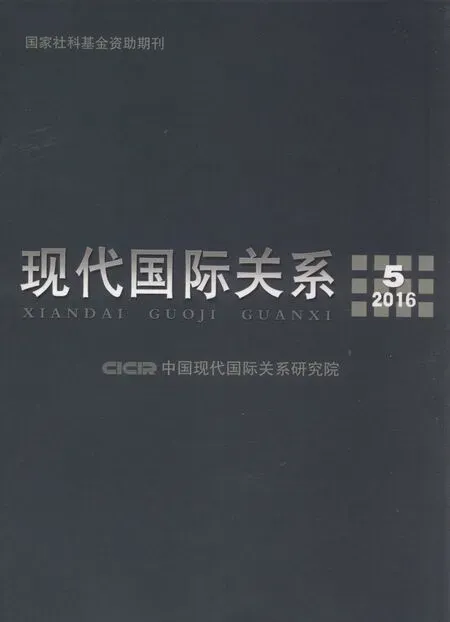Abstracts
2016-11-25
s
North Korea’s Fourth Nuclear Test and New Changes in Northeast Asia
LinLimin&ZhengYu
Abstract: North Korea’s fourth nuclear test exposed its nuclear power and nuclear intentions. The policies of various relevant parties towards North Korea’s nuclear power, North Korea and the Korean Peninsula become more obvious. North Korea will not easily abandon its nuclear power since it has promoted nuclear development to the level of “thermal nuclear weapons”. The policies of the US, South Korea and Japan will be transferred to realism, namely, their priorities will transform from “seducing North Korea to abandon nuclear weapons” to “speeding up regime change”. Consequently, new changes will take place in Northeast Asia. The US, South Korea and Japan will strengthen their alliance and the situations in the Korean Peninsula and Northeast Asia will be more complicated, more chaotic and tenser, though the erstwhile Cold War structure will not be restored in Northeast Asia.
Nuclear development, North Korea, East Asia security
An Analysis of Obama’s North Korea Policy
YangWenjing
Abstract: As a US president who is famous for his “stretching out” diplomacy, Obama has long adopted a “strategic patience” policy towards North Korea, with all-around encirclement and coercion against North Korea. The reasons behind are the US notion that North Korea has yet constituted a vital threat to the US interest, the deep-rooted mistrust from the US towards North Korea, and the negative image of a long-time enemy held by the US on North Korea, as well as the intention to utilize the issue to constrain and engage China simultaneously. In future, as long as these fundamental preconditions do not change, it’s unlikely for the US to shift this “strategic patience” policy. The result of the upcoming election in the US may have an important impact on the trend of this policy.
Keywords: the US, Obama, North Korea policy, strategic patience
The Trend and Impact of UN Sanctions on North Korean Economy
LinJinshu&JinMeihua
Abstract:Since Kim Jeong-eun took power, North Korea’s economy has shown signs of improvement. The UN Security Council adopted resolution 2270 to impose sanctions against North Korea in the wake of its fourth nuclear test. The implementation of the resolution will not only affect the foreign trade and investment of North Korea, but also influence the special economic development zones in North Korea. Meanwhile, it might affect on the enterprises’ operating rate and livelihood of the people. However, it is difficult for the UN to achieve its goal in a short period of time. Because most of the North Koreans had experienced nutritional deprivation long before the mid-1990s, they conducted the implementation of ‘our new economic management system’. Moreover, substantial diffusion of market economy is expected to play an important supporting role. Therefore, the impact of sanctions on the trade between China and North Korean is less than expected. However, in the long term, it is difficult for North Korea to achieve fundamental economic changes, if it does not abandon its nuclear power.
Keywords: North Korea, UN Security Council, North Korean Economy, New Economic and Management System
Refugee Protection Predicament from the perspectives of International Law and International Politics
WuWenyang
Abstract: The 2015 European refugee crisis has posed great challenges to Europe. Europe’s response to this crisis remains inadequate and many refugees are still facing desperate situation. This paper looks into this crisis and discusses three major hurdles to refugee protection, which include the narrow definition of “refugee” and inconsistency in refugee status determination, lack of minimum temporary protection, and lack of effective international cooperation. The problem of refugee protection should be handled cautiously for it touches upon a host nation’s law and politics, and different aspects of people’s lives. It may cause conflicts between different groups and lead to instability of society. To better solve the refugee problem, countries should promote a comprehensive legal system to protect refugees and handle the mass influx emergencies. Regional and international cooperation should also be enhanced to provide more humanitarian assistance for refugees.
Keywords: European refugee crisis, refugee status determination, temporary protection, international refugee protection
An Analysis of the Predicament of German “Leadership Capacity”
LiChao&WangShuo
Abstract: Germany is playing such a part as “leading role” in the EU. However, it isn’t yet adept at using its power and is confronted with many difficulties when dealing with challenges from both in and outside the EU. The “predicament of leadership capacity” that Germany faces is largely caused by its typical national character and historical experiences, and also reinforced by drastic changes of the International situation, which Germany fails to adapt itself to. Germany is gradually coming to realize it, and thus endeavours to adjust its policies, allowing it to push forward the European integration process with more flexible measures and meanwhile dealing with International affairs on its own initiative. Looking forward, Germany will gradually get used to its own role as well as the changed external environment, and become a unique leader.
Keywords: Germany, leading capacity, European integration, International responsibility
(Edited by Zhao Jinfu)
